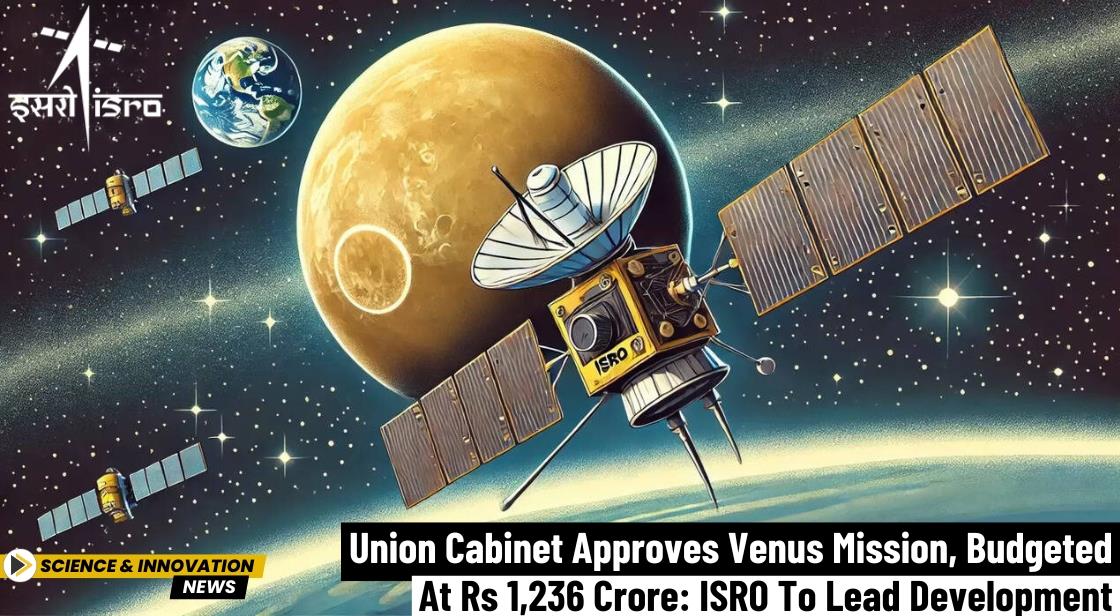Union Cabinet Approves Venus Mission, Budgeted at Rs 1,236 Crore: ISRO to Lead Development

News Synopsis
In a groundbreaking move, the Union Cabinet has given the green light to the development of the Venus Orbiter Mission (VOM), signaling India's ambitious leap in planetary exploration. This landmark decision comes after the successful exploration of the Moon and Mars, underscoring the Indian government’s expanding vision for space exploration. The mission to Venus, the closest planet to Earth, represents a significant step forward for India in its quest to explore the vast expanse of our solar system.
Overview of the Venus Orbiter Mission (VOM)
The Venus Orbiter Mission is set to be executed by the Department of Space and will involve deploying a scientific spacecraft to orbit Venus. The primary objective of this mission is to gather crucial data about Venusian surface and subsurface conditions, atmospheric processes, and the interaction between the Sun and Venus’s atmosphere. This will help deepen our understanding of Venus, a planet that was once thought to be habitable and exhibited Earth-like conditions in its early history.
By studying Venus, Indian scientists hope to unravel the mysteries of the planet’s transformation and draw parallels to the evolutionary paths of Venus and Earth. The mission is expected to provide key insights that will benefit planetary science, particularly in understanding how planets evolve over time under different environmental conditions.
ISRO to Lead the Mission’s Development and Launch
The Indian Space Research Organisation (ISRO) has been entrusted with the development and launch of the Venus Orbiter Mission. Drawing from its extensive experience in successful space missions, ISRO will oversee the entire project, from the design and development of the spacecraft to its launch and data collection. Following ISRO’s established protocols, the data collected from this mission will be made available to the scientific community through existing dissemination channels.
Scheduled for launch in March 2028, the mission has been allocated a budget of Rs. 1,236 crore, of which Rs. 824 crore will be used for the development of the spacecraft, including the payloads, technological advancements, ground station support, and the launch vehicle. This mission will be a significant boost to India’s capabilities in planetary science and space technology.
Collaborative Efforts with Indian Industries and Academia
A unique aspect of the Venus Orbiter Mission is the strong collaboration with Indian industries in the development of the spacecraft and launch vehicle. This partnership will not only enhance India’s domestic space industry but also lead to significant technology spin-offs across other sectors. Additionally, academic institutions and students will be actively involved in various phases of the project, from design and testing to development and calibration.
This inclusive approach will foster capacity-building in India’s space ecosystem, while also creating substantial employment opportunities for young engineers, scientists, and technicians. The mission’s multidisciplinary approach ensures that India’s space sector will benefit from fresh talent and new ideas, further solidifying the nation’s position as a global space power.
Technological Advancements and Scientific Instruments on the Venus Orbiter Mission
The Venus Orbiter Mission will carry a suite of innovative scientific instruments designed to gather valuable data about Venus’s surface composition, atmosphere, and solar interactions. These instruments will allow Indian scientists to conduct in-depth studies of the planet's conditions, contributing significantly to the global understanding of planetary atmospheres and climate systems.
Importance of Studying Venus: Earth’s “Twin” Planet
Studying Venus is of paramount importance as it holds many parallels to Earth. Both planets are often referred to as “twins” due to their similar size, composition, and proximity to the Sun. However, while Earth supports life, Venus has evolved into a planet with extreme temperatures and toxic gases. By investigating Venus’s history and atmosphere, scientists aim to understand why the two planets, despite having similar starting points, followed vastly different evolutionary trajectories.
The data obtained from this mission could help in predicting the long-term effects of climate change on Earth, offering critical lessons about atmospheric transformation, greenhouse effects, and planetary habitability.
Paving the Way for Future Planetary Missions
The Venus Orbiter Mission is not just a milestone in itself but also lays the groundwork for future planetary exploration missions. The insights and technological developments gained from this mission will position India as a key player in future planetary missions, opening new avenues for scientific research. This mission could also inspire international collaborations, with data sharing and joint research contributing to humanity’s collective understanding of planetary science.
You May Like









